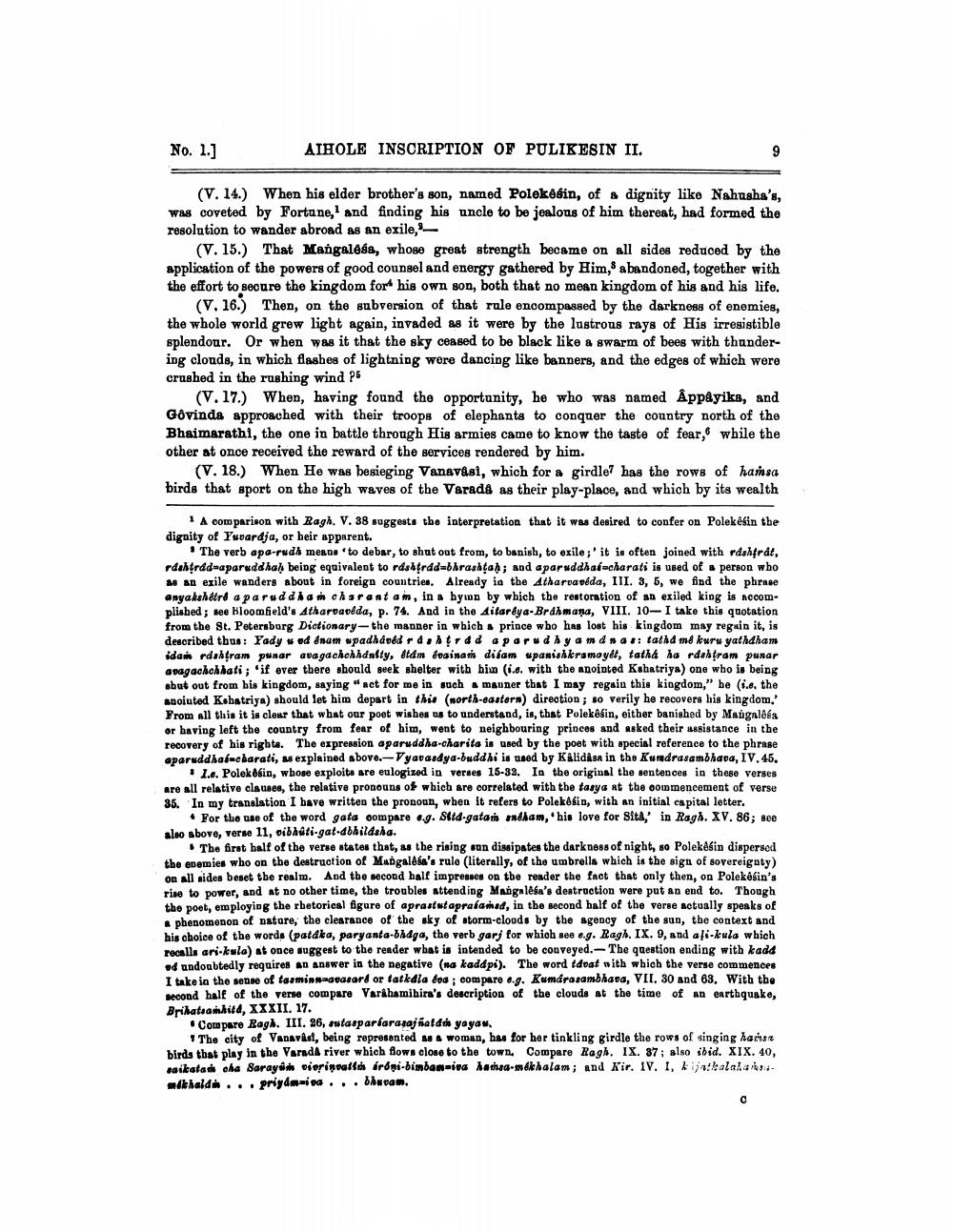________________
No. 1.]
(V. 14.) When his elder brother's son, named Polekesin, of a dignity like Nahusha's, was coveted by Fortune, and finding his uncle to be jealous of him thereat, had formed the resolution to wander abroad as an exile,
AIHOLE INSCRIPTION OF PULIKESIN II.
9
(V. 15.) That Mangalésa, whose great strength became on all sides reduced by the application of the powers of good counsel and energy gathered by Him, abandoned, together with the effort to secure the kingdom for his own son, both that no mean kingdom of his and his life. (V. 16.) Then, on the subversion of that rule encompassed by the darkness of enemies, the whole world grew light again, invaded as it were by the lustrous rays of His irresistible splendour. Or when was it that the sky ceased to be black like a swarm of bees with thundering clouds, in which flashes of lightning were dancing like banners, and the edges of which were crushed in the rushing wind ?5
(V. 17.) When, having found the opportunity, he who was named Appâyika, and Govinda approached with their troops of elephants to conquer the country north of the Bhaimarathi, the one in battle through His armies came to know the taste of fear, while the other at once received the reward of the services rendered by him.
(V. 18.) When He was besieging Vanavasi, which for a girdle has the rows of hamsa birds that sport on the high waves of the Varada as their play-place, and which by its wealth
1 A comparison with Ragh. V. 38 suggests the interpretation that it was desired to confer on Polekêśin the dignity of Yuvaraja, or heir apparent.
The verb apa-rudh means to debar, to shut out from, to banish, to exile;' it is often joined with rashtrát, rashtrad-aparuddhaḥ being equivalent to rdshṭrdd-bhrashṭaḥ; and aparuddhat-charati is used of a person who as an exile wanders about in foreign countries. Already in the Atharvaveda, III. 3, 5, we find the phrase anyakshétre a paruddham charantam, in a hymn by which the restoration of an exiled king is accomplished; see Bloomfield's Atharvaveda, p. 74. And in the Aitareya-Brahmana, VIII. 10-I take this quotation from the St. Petersburg Dictionary-the manner in which a prince who has lost his kingdom may regain it, is described thus: Yady u od énam upadhávéd rashtrad aparudhyamd nas: tatha me kuru yathdham idam rashtram punar avagachchhanity, étam évainam diíam upanishkramayét, tatha ha rashtram punar avagachchhati; 'if ever there should seek shelter with him (i.e. with the anointed Kshatriya) one who is being shut out from his kingdom, saying "act for me in such a manner that I may regain this kingdom," he (i.e. the anointed Kshatriya) should let him depart in this (north-eastern) direction; so verily he recovers his kingdom,' From all this it is clear that what our poet wishes us to understand, is, that Polekêsin, either banished by Mangaldea or having left the country from fear of him, went to neighbouring princes and asked their assistance in the recovery of his rights. The expression aparuddha-charita is used by the poet with special reference to the phrase aparuddhaf charati, as explained above.-Vyavasdya-buddhi is used by Kalidasa in the Kumdrasambhava, IV. 45. I.e. Polekêsin, whose exploits are eulogized in verses 15-32. In the original the sentences in these verses are all relative clauses, the relative pronouns of which are correlated with the tasya at the commencement of verse 35. In my translation I have written the pronoun, when it refers to Polekêsin, with an initial capital letter.
For the use of the word gata compare e.g. Std-gatam néham, 'his love for Sita,' in Ragh. XV. 86; see also above, verse 11, vibhuti-gat-dbhildsha.
The first half of the verse states that, as the rising sun dissipates the darkness of night, so Polekêsin dispersed the enemies who on the destruction of Mangalésa's rule (literally, of the umbrella which is the sign of sovereignty) on all sides beset the realm. And the second half impresses on the reader the fact that only then, on Polekêsin's rise to power, and at no other time, the troubles attending Mangalêsa's destruction were put an end to. Though the poet, employing the rhetorical figure of aprastutapraíamed, in the second half of the verse actually speaks of a phenomenon of nature, the clearance of the sky of storm-clouds by the agency of the sun, the context and his choice of the words (pataka, paryanta-bhaga, the verb garj for which see e.g. Ragh. IX. 9, and ali-kula which recalls ari-kula) at once suggest to the reader what is intended to be conveyed. The question ending with kadd ed undoubtedly requires an answer in the negative (na kaddpi). The word ideat with which the verse commences I take in the sense of tasminn-avasard or tatkala éoa; compare e.g. Kumarasambhava, VII. 30 and 63. With the second half of the verse compare Varâhamihira's description of the clouds at the time of an earthquake, Brihatsamhitd, XXXII. 17.
Compare Ragh. III. 26, sutasparíarasaj atdi yayas.
The city of Vanavasi, being represented as a woman, has for her tinkling girdle the rows of singing hansa birds that play in the Varada river which flows close to the town. Compare Ragh. IX. 37; also ibid. XIX. 40, saikatam cha Sarayûm vieṛinvalli íróṇi-bimbam-iva haṁsa-mékhalam; and Kir. IV. I, kijatkalalak mikhaldin... priyámniva... bhuvam.
с




